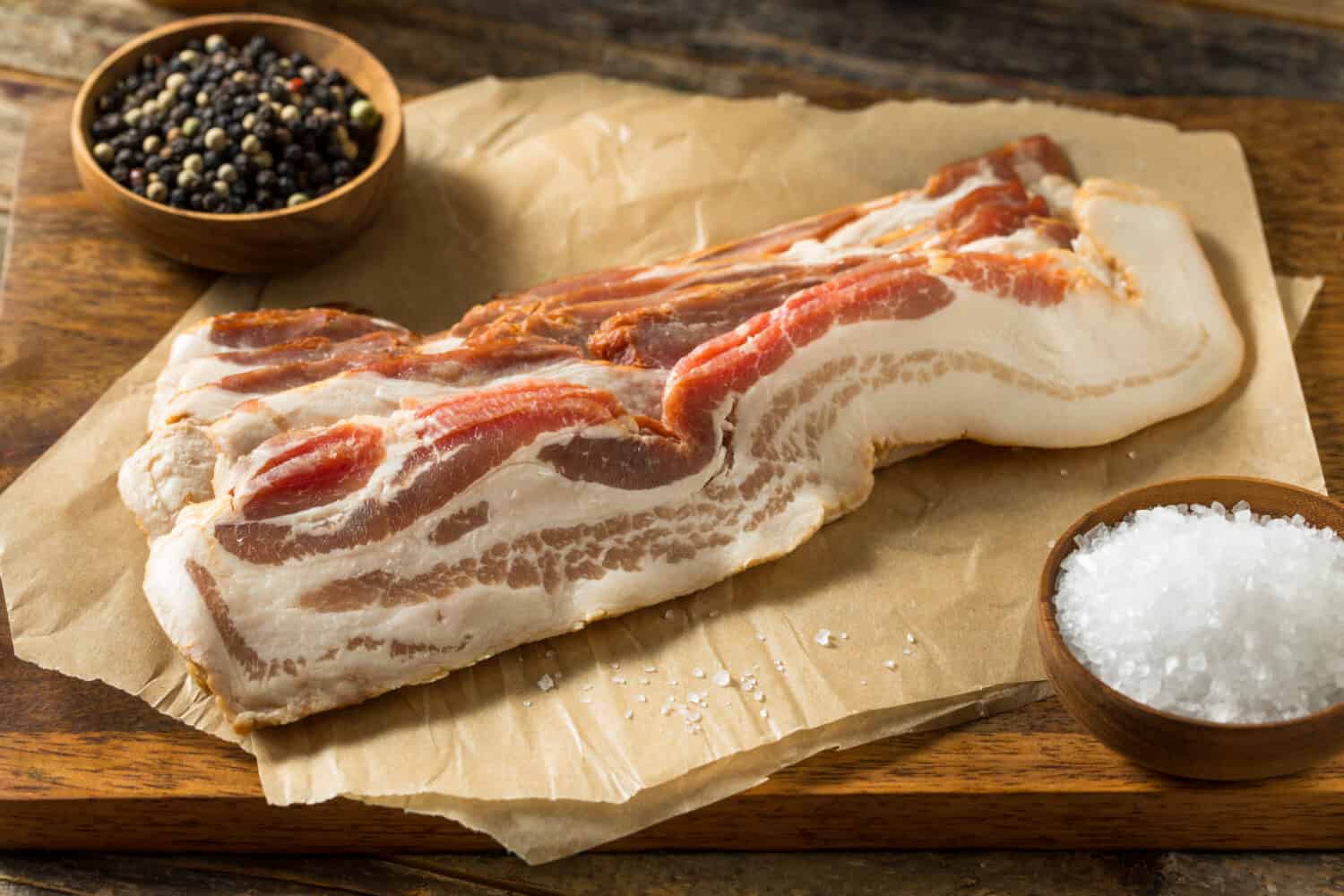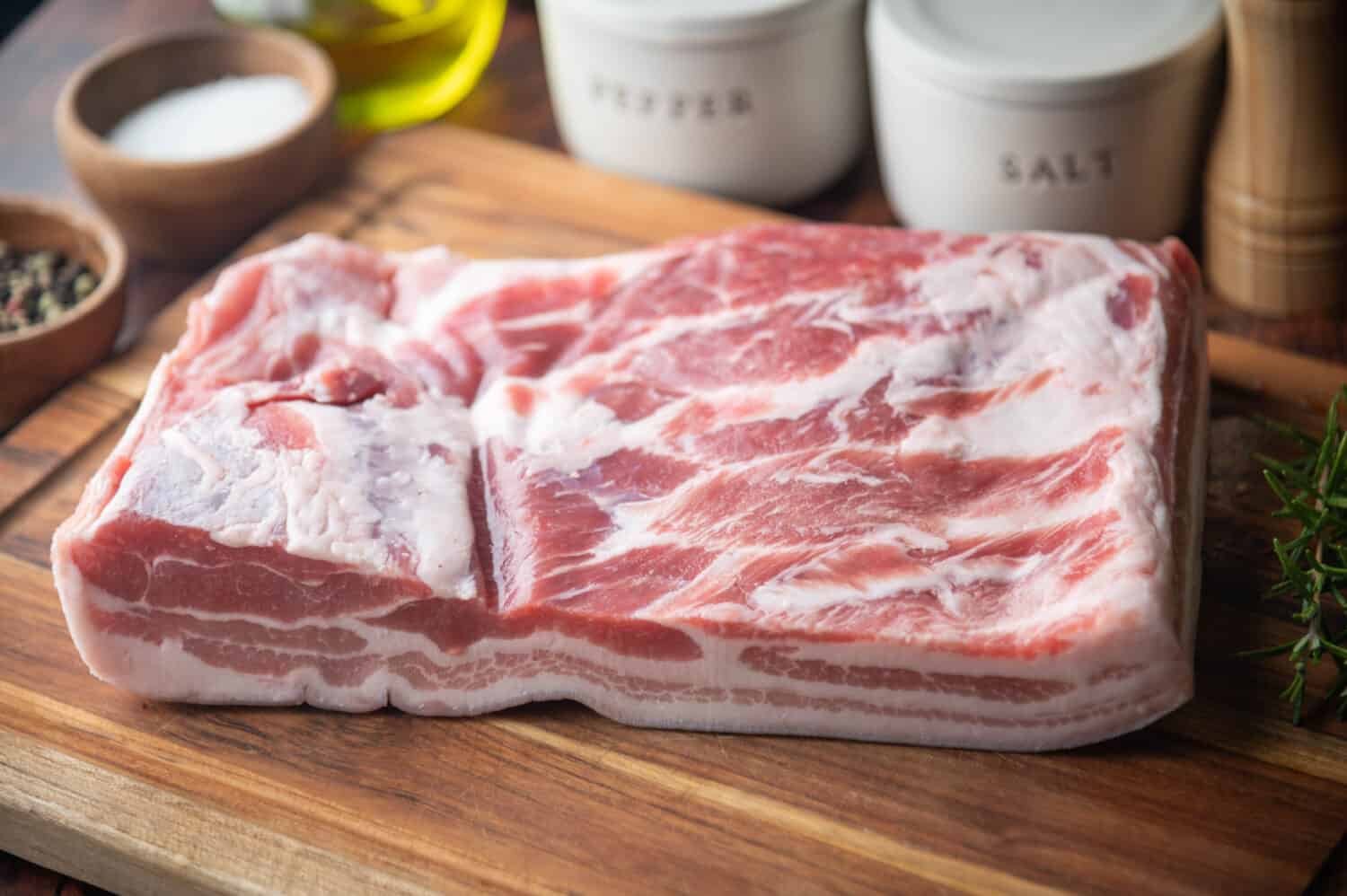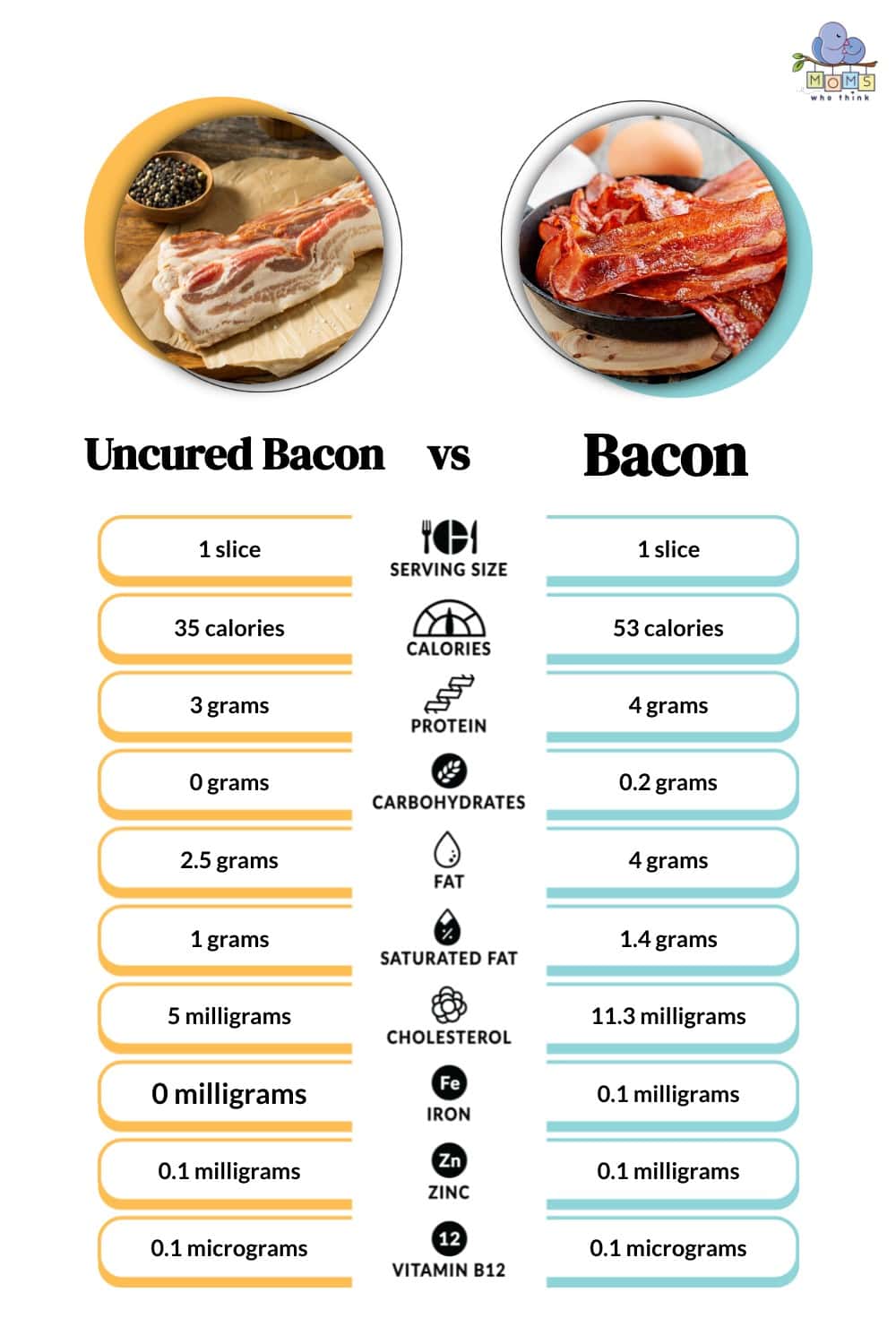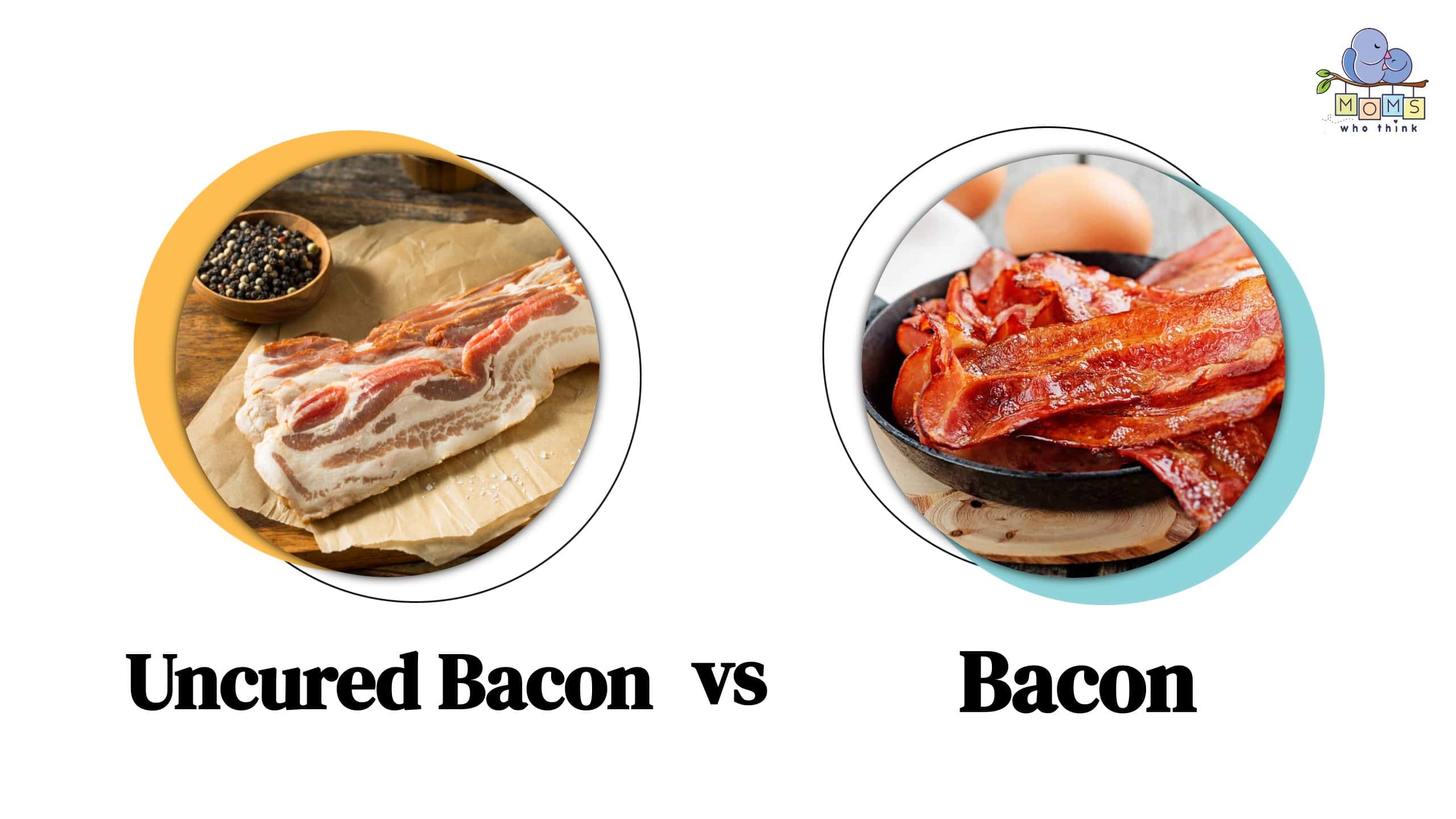Imagine waking up to the sizzling sound and smell of mouth-watering bacon as you roll out of bed. You can almost taste the delicious flavor. Can you taste if it’s uncured or regular bacon? Are there really key differences between uncured bacon vs. bacon? In a nutshell, yes! While both are “cured” in their own way, the main difference is regular bacon – which we’ll just call bacon in this article – uses artificial nitrates that act as preservatives and usually has a more distinct and smoky flavor. However, there are other important differences – that may be shocking – but you need to know in order to make an informed decision for you and your family.
Uncured Bacon vs. Bacon: Key Differences
As mentioned above, both uncured bacon and bacon are cured which may come as a surprise especially because of the way uncured bacon is marketed in America. The process on how each are cured is what makes them different.

©Brent Hofacker/Shutterstock.com
Uncured Bacon
It may surprise you to know uncured bacon has its own “curing process” with nitrites and nitrates. For example, nitrites and nitrates can come from natural things like celery salt or juice and even beet, arugula and spinach are commonly used to cure bacon. However, because these nitrites and nitrates are not made in a lab, the USDA considers meat that is not treated with synthetic preservatives has to be labeled as “uncured” and “no nitrates or nitrites added.” It also has a milder, more natural pork flavor.
Bacon
On the other hand, according to the Department of Agriculture’s labeling regulations, in order for bacon to be called “cured” it must be processed with salt. These are in the form of synthetic sodium nitrites or sodium nitrates. Both nitrates and nitrites act as artificial preservatives in order for bacon to last a long time. They also help protect the bacon from harmful bacteria thus lessening the chances of consumers contracting food poisoning. Cured bacon has a longer shelf life thanks to the preservatives used in the curing process.
But, in reality, these natural and synthetic curing agents are the same chemically.
Uncured Bacon vs. Bacon: Curing & Cooking
The curing process preserves the flavor of the bacon, which is what gives it a distinctive taste such as sweet, smoky, or salty flavor. Overall, the bacon's taste can be different based upon the breed of the pig, the kind of diet it has, the ingredients used, how it's cured, and the kind of wood used for smoking it. In regards to turkey bacon, it is made up of of ground or chopped turkey – both white and dark meat – that's taken from the thighs, breast, and even the skin of the bird. The curing process is the same for both pork and turkey bacon.
Uncured Bacon
This is a more natural and simple process compared to traditional cured bacon. For example, after selecting the belly area of the pig, here’s what’s usually done next:
Brine or Dry Rub Coating
This may consist of a mixture of ingredients such as sea salt, sugar (sometimes maple syrup or honey for sweetness), and various seasonings like black pepper or herbs. Then the pork belly is thoroughly coated with the brine or dry rub mixture.
Refrigeration
After coating the pork belly, it is left in the refrigerator, for typically several days to allow the flavors from the brine or dry rub to infuse into the meat.

©Atsushi Hirao/Shutterstock.com
Optional Step
If you’ve ever tasted bacon that has a smoky flavor, then most likely this step was done.
This is where the bacon is exposed to smoke from wood chips or logs.
Bacon
On the other hand, the process of bacon is slightly different and can be done two different ways once the part of the pork is chosen – usually the belly.
Here are the two main ways to cure bacon:
Dry Curing
A mixture of salt, sugar, and a curing agent (like sodium nitrate or nitrite) is rubbed on the pork belly. The pork is typically kept in the refrigerator for an extended period, often a week or more. This process allows the salt and curing agents to penetrate the meat. This is the preservation period, which allows the flavors to develop.
Wet Curing
This process involves putting the pork belly in a brine solution made of water, salt, sugar, and curing agents like sodium nitrate or nitrate. The meat is soaked in this solution as a way to give the curing agents time to penetrate the meat. It is a much faster method compared to dry curing and is commonly used in commercial bacon production.
What Happens During the Curing Process?
This is where chemistry really happens! As the pork cures, the salt and curing agents help preserve the meat by preventing bacterial growth. At the same time, the flavors become more pronounced and so does the color of the bacon.
Optional Ways to Continue Curing
Smoking
After curing, some bacon is smoked to add a smoky flavor and color. This is typically done using wood chips or sawdust. The bacon is placed in a smokehouse or smoker for several hours, allowing the smoke to penetrate the meat.
Drying and Aging
Some artisanal bacon producers might air-dry or age it more for extra flavor. You usually won’t find this in your everyday grocery stores. It is more commonly found in gourmet meat markets or grocery stores.
Cooking
For both uncured bacon and bacon, you can cook them the same. This can be frying, baking, or grilling it until it reaches your desired level of crispiness.

©Roman Samborskyi/Shutterstock.com
Uncured Bacon vs. Bacon: Shocking Health Discovery
Most people know about the health risks involved with bacon which contains artificial preservatives such as nitrites and nitrates. As Kate Allen, the executive director of science and public affairs at the World Cancer Research Fund says, “It’s not so much nitrates/nitrites per se [that are carcinogenic], but the way they are cooked and their local environment that is an important factor… For example, nitrites in processed meats are in close proximity to proteins (specifically amino acids). When cooked at high temperatures, this allows them to more easily form nitrosamines (pronounced “ni–tro–sa–means”), the cancer-causing compound.”
BUT – what many do not realize is the health concerns that can come from uncured bacon. They contain nitrates, too.
Most uncured bacon is sold in grocery stores as “all-natural” because it doesn’t contain added nitrates or nitrites which are synthetic. Instead, you may see manufacturers use, according to the label, celery powder as a curing agent. Celery juice powder acts as a natural preservative to produce the same effect. You may be thinking right about now that you need to toss your bacon from the fridge to the trash and head right out to buy uncured bacon.
Is Uncured Bacon Better for You?
Hold on! Let’s dive a little further to help you make an informed decision. Why? Because if you’re like some, when you see the words “uncured” and “no nitrates or nitrites added”, what usually happens? You think the bacon is healthier, right? Well, that’s not exactly true. Labels can be confusing. In fact, those terms can be downright misleading. You see, although celery contains antioxidants like vitamin C, which helps protect you from the cancer-causing nitrosamines found in cooked processed meats, celery powder is different.
Although there is not enough evidence to draw a strong conclusion, the Organic Consumers Association says, “Just like synthetic nitrates, when celery powder's naturally occurring nitrates interact with proteins in red meat, they form nitrosamines. Nitrosamines, no matter how they are formed, are carcinogenic even in very small amounts.”
In fact, according to the USDA’s Food and Safety Service, fried bacon – whether uncured or not – is one of the most significant dietary sources of nitrosamines! That's why moderation is key.
Uncured Bacon vs. Bacon: What Nitrates/Nitrites Do To Your Body
Here’s something you may not realize: When you eat nitrates, your body doesn't do much to them. So why the fuss over nitrates and nitrites? Because it changes them into nitrites using bacteria in your mouth or enzymes in your body. The good news is that these nitrites can turn into good things like the healthy boosting nitric oxide. On the other hand, they can also turn into nitrosamines, which, according to the World Health Organization, can increase your risk of cancer.
Uncured Bacon vs. Bacon: Nutritional Value

Final Thoughts:
Now, you have the knowledge to make an informed decision when it comes to deciding between uncured bacon vs. bacon. The key difference between the two lies in the absence of synthetic curing agents or artificial preservatives. Uncured bacon uses natural ingredients and a simpler preservation process. It tends to have a milder, purer pork flavor and is often perceived as a healthier alternative by those looking to avoid artificial additives like sodium nitrate/nitrite. However, because both contain nitrates and nitrites, which can pose serious health threats, it is important to eat in moderation.
Mouth-Watering Recipes with Bacon
Bacon, Spinach and Cheese Quiche
Bacon Wrapped Apple Barbecue Chicken

